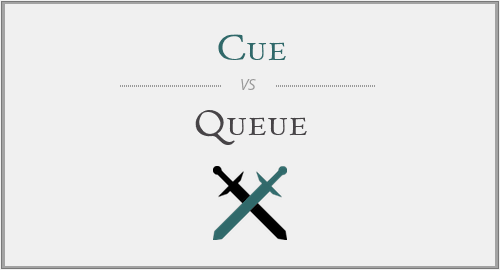Cue” and “queue” are one of the problematic English words, especially for inexperienced users. The confusion is owed, obviously, to the amazing similarity between their pronunciation. If you don’t see these words written, you can hear “cue” and “queue” spelled exactly the same. Furthermore, this creates the illusion that they are the same word, and people start doubting whether they should choose one form or the other when writing their texts.
If you are unsure about how “cue” and “queue” are used correctly, you will learn, below, the accurate meanings of these words and the correct ways to use them. “Cue” and “queue” definitely do not refer to the same thing, there is a major difference between their meanings, and we are going to show you how to remember their correct spellings according to their lexical significations.
Cue vs. Queue
So, the main distinction between “cue” and “queue” is made by their lexical meanings. One word defines a particular concept, while the other refers to a completely different thing. The words are not synonyms or two similar spellings of the same idea, but two paronyms.
Secondly, there is also a slight grammatical difference in this pair of words. “Cue” is always used as a noun, defining different things in all its contexts and meanings; “queue”, on the other hand, can be used both as a noun and as a verb sometimes, defining both a concept and an action. You can check all these aspects below, where we’ve prepared some relevant examples for you.
When do we use “cue”?
“Cue” is always used as a noun. In the first place, the word defines a sign, or a signal – more exactly, an action or an event that is a sign that something should or is about to happen. And secondly, “cue” can also refer to that signal that tells an actor or a player in a movie, in a show or other performance, that it’s their turn to film, speak, dance sing or act, a start signal.
Example 1: The final verse of the “Happy Birthday” song was the cue for the real party. – “cue” refers to the clue or signal that something should happen or start happening.
Example 2: Wait for the cue and then say your lines – that’s when they’ll start filming. – “cue” can also refer to the signal that one can start playing in a film, for example.
When do we use “queue”?
Broadly, “queue” is used as a noun. It refers to that line or row of people who are positioned one behind the other while waiting for something. But sometimes, generally in British English, “queue” can also function as a verb, referring to the action of lining up, of people positioning themselves in a row,
one behind the other, usually in order to wait for something. In this case, the verb will most frequently appear in the structure “queue up”.
Example 1: Please wait at the end of the queue, I will serve you when it will be your turn. – used as a noun, “queue” refers to the line that is formed when people stay in a row, one behind the other, waiting for something.
Example 2: When the tickets will start being sold, people will quickly queue up to buy them. – as a verb, “queue” (mainly used as “queue up”) refers to the action of lining up to wait for something.
Conclusion
“Cue” and “queue” might sound perfectly identical, but their spellings aren’t the same and neither their meanings. Each word carries a different signification and each should be used accordingly. Remember that “queue” is the longer word, referring to a long row of people waiting for something, whereas “cue” is the short spelling, referring to a short clue or signal that something is about to start. These short/long characteristics of these words can be some great clues for you to remember which word refers to what and when you should use the correct form!





Have a discussion about this article with the community:
Report Comment
We're doing our best to make sure our content is useful, accurate and safe.
If by any chance you spot an inappropriate comment while navigating through our website please use this form to let us know, and we'll take care of it shortly.
Attachment
You need to be logged in to favorite.
Log In